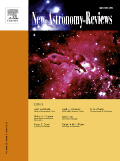
NEW ASTRONOMY REVIEWS
metrics 2024
Illuminating the Stars: Where Rigorous Research Meets Cosmic Discovery
Introduction
NEW ASTRONOMY REVIEWS, published by Elsevier Science Ltd, stands as a premier journal in the field of Astronomy and Astrophysics as well as Space and Planetary Science. Established in 1998 and operating until 2024, this journal has consistently maintained a distinguished reputation, reflected in its Q1 categorization in both subject areas for 2023. It holds an impressive Scopus ranking, placed #6 out of 104 in Earth and Planetary Sciences and #7 out of 90 in Physics and Astronomy, showcasing its critical impact with a percentile rank of 94th and 92nd, respectively. Although not an open access journal, it provides vital insights and comprehensive reviews that are essential for researchers, professionals, and students eager to advance their knowledge in contemporary astronomical research and theories. With rigorous peer review and a commitment to high-quality publications, NEW ASTRONOMY REVIEWS is an indispensable resource for the scientific community striving to uncover the mysteries of the universe.
Metrics 2024
 2.95
2.95 11.70
11.70 9.70
9.70 64
64Metrics History
Rank 2024
Scopus
IF (Web Of Science)
JCI (Web Of Science)
Quartile History
Similar Journals

JOURNAL OF ASTROPHYSICS AND ASTRONOMY
Unraveling the Secrets of Space and Time.JOURNAL OF ASTROPHYSICS AND ASTRONOMY, published by the Indian Academy of Sciences, stands as a pivotal resource for researchers and professionals in the fields of astrophysics and astronomy, with a rich history of publication dating back to 1980. This esteemed journal aims to disseminate high-quality research, fostering advancements in how we understand celestial phenomena, space environments, and planetary sciences. With a current Impact Factor that places it in the Q3 category for both Astronomy and Astrophysics and Space and Planetary Science, it maintains a crucial role in the global academic community, particularly within India. Although not an open access journal, its scholarly contributions are vital for both emerging and established researchers striving to push the boundaries of our knowledge in the cosmos. The journal is indexed in Scopus, ranking 56th in Astronomy and Astrophysics and 72nd in Space and Planetary Science, reflecting its ongoing significance and reach in the scientific dialogue.

ACTA ASTRONOMICA
Exploring the Cosmos: Where Knowledge Meets the StarsACTA ASTRONOMICA, the esteemed journal published by the COPERNICUS FOUNDATION POLISH ASTRONOMY, is a pivotal platform for disseminating significant advancements in the fields of Astronomy, Astrophysics, and Space Science. With an established history spanning from 1996 to 2023, this journal maintains a strong position in academia, evidenced by its Q2 ranking in both Astronomy and Astrophysics as well as Space and Planetary Science categories. Targeted at researchers, professionals, and students, ACTA ASTRONOMICA offers a comprehensive collection of articles that foster a deeper understanding of celestial phenomena, planetary exploration, and theoretical advancements in the universe. While it is not an open-access journal, its structured format caters to a global audience eager to engage with cutting-edge research. Notably, its Scopus rankings highlight its relevance, placing it in the 56th percentile for Astronomy and Astrophysics and the 44th percentile for Space and Planetary Science, ensuring that contributors are part of an influential community that is shaping the future of astronomical study.

Advances in Astronomy and Space Physics
Illuminating the Universe Through Rigorous Inquiry.Advances in Astronomy and Space Physics is an esteemed journal dedicated to the exploration and dissemination of research in the expansive fields of astronomy and space science. Published by Taras Shevchenko National University of Kyiv, this journal provides a platform for researchers, professionals, and students to share groundbreaking studies and innovations. With an ISSN of 2227-1481, it covers a wide range of subjects including astrophysics, planetary sciences, and space exploration technologies, thereby fostering interdisciplinary collaboration. Although not an Open Access journal, it maintains a commitment to high-quality, peer-reviewed content that contributes significantly to the advancement of scientific knowledge. The journal's mission is to promote sustainable practices in space research while also exploring the implications of discoveries on Earth and beyond. By maintaining rigorous publication standards, Advances in Astronomy and Space Physics aims to serve as a critical resource for those involved in the ever-evolving study of our universe.

Bulgarian Astronomical Journal
Fostering Collaboration in Celestial DiscoveriesThe Bulgarian Astronomical Journal, published by the BULGARIAN ACADEMY OF SCIENCES, INSTITUTE OF ASTRONOMY, serves as a vital platform for the dissemination of research in the field of Astronomy and Astrophysics. With the ISSN 1313-2709 and E-ISSN 1314-5592, this journal has been pivotal in showcasing original studies and advancements in astronomical sciences from 2014 and will continue to do so through 2025. Although categorized in Q4 within the ambit of Astronomy and Astrophysics, it provides essential insights and innovative findings, making significant contributions to the global academic community. Positioned in the lower quartile of Scopus rankings, recognized as #87 out of 90, it offers an opportunity for burgeoning researchers and seasoned professionals alike to engage with emerging ideas and trends in the discipline. While it currently does not feature an open access model, readers and contributors can anticipate a rich exchange of scientific knowledge that fosters collaboration within the astronomy community.
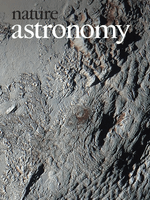
Nature Astronomy
Advancing Astronomy: Your Gateway to Cutting-Edge Research and Discoveries.Nature Astronomy, published by NATURE PORTFOLIO, stands at the forefront of the field of Astronomy and Astrophysics. Since its inception in 2016, this esteemed journal has rapidly ascended to a prestigious position, achieving a Q1 ranking in the Astronomy and Astrophysics category and securing an impressive 6th place out of 90 journals in the Scopus rankings, placing it in the 93rd percentile. With a focus on disseminating pioneering research, Nature Astronomy provides a vital platform for the dissemination of high-quality, impactful findings across various aspects of astronomical science. Researchers, professionals, and students alike will find a wealth of knowledge and innovative perspectives within its pages, enabling them to stay ahead in a rapidly evolving field. Although it does not offer open access, the journal's commitment to excellence and its influence in shaping the future of astronomical research make it an indispensable resource for anyone serious about advancing their understanding of the cosmos.
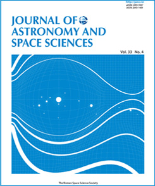
Journal of Astronomy and Space Sciences
Where Groundbreaking Research Meets Open Access.The Journal of Astronomy and Space Sciences, published by the Korean Space Science Society, is a premier open-access platform dedicated to advancing the fields of astronomy, astrophysics, and space sciences. Established in 1984, the journal has been instrumental in disseminating high-quality research findings, fostering collaboration among scientists globally, and providing insights into the dynamics of our universe. With an ISSN of 2093-5587 and an E-ISSN of 2093-1409, the journal has gained notable recognition, currently ranking in the Q3 quartile in Earth and Planetary Sciences and Physics and Astronomy as of 2023. Although the journal's H-Index is currently unspecified, its commitment to rigorous peer-review processes and open-access availability ensures that groundbreaking research is accessible to a wide audience. Based in Seoul, South Korea, the journal is poised to continue supporting innovative research through 2024 and beyond. Researchers, professionals, and students alike will find valuable resources and opportunities within its pages, further establishing this journal as a crucial resource in the exploration of the cosmos.

Contributions of the Astronomical Observatory Skalnate Pleso
Connecting Scholars: Advancing Astronomy Through Open DiscourseContributions of the Astronomical Observatory Skalnate Pleso, published by the Slovak Academy of Sciences Astronomical Institute, serves as a vital platform for the dissemination of research in the realm of Astronomy and Astrophysics. With its ISSN number 1335-1842 and E-ISSN 1336-0337, this esteemed journal aims to foster scientific discourse and innovation among researchers, professionals, and students alike. Although it currently holds a Q4 quartile ranking in its field as of 2023, the journal encourages contributions that enhance our understanding of universe dynamics and celestial phenomena through rigorous research methodologies. Spanning from its inaugural year in 2007 to the projected continuation through 2024, it integrates local insights from Slovakia with broader international endeavors in astronomy. The journal promotes an open-access approach, providing scholars unrestricted access to valuable findings and discussions, thereby advancing the boundaries of astronomical knowledge.
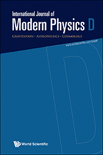
INTERNATIONAL JOURNAL OF MODERN PHYSICS D
Charting New Territories in Scientific UnderstandingWelcome to the INTERNATIONAL JOURNAL OF MODERN PHYSICS D, a premier publication dedicated to the advancement of knowledge in the fields of Astronomy and Astrophysics, Mathematical Physics, and Space and Planetary Science. Published by WORLD SCIENTIFIC PUBL CO PTE LTD in Singapore, the journal boasts an impressive impact, being ranked Q2 in Astronomy and Astrophysics and Mathematical Physics, and Q3 in Space and Planetary Science. With a converged publishing timeline from 1996 to 2024, this journal provides a vital platform for researchers and professionals to disseminate their findings, engage with cutting-edge research, and explore emerging ideas in modern physics. Although it operates under a traditional access model, the rigorous peer-reviewed process ensures that only the highest quality research contributes to the collective understanding of our universe. Join us in advancing the frontiers of physics and astronomy!

Universe
Unveiling the Wonders of the Universe Through Research.Universe is a distinguished peer-reviewed journal published by MDPI, specializing in the dynamic fields of Physics and Astronomy. Established in 2015, this Open Access journal has rapidly gained recognition, achieving a prestigious Q1 quartile ranking in its category as of 2023. With its E-ISSN 2218-1997, the journal primarily serves the international scientific community, offering a platform for researchers to disseminate innovative ideas and findings. Based in Switzerland, Universe covers a wide range of topics within astronomy and astrophysics, ensuring that cutting-edge research is accessible to an ever-growing audience. Its commitment to open access principles since its inception allows for unrestricted dissemination of knowledge, fostering a collaborative environment essential for scientific advancement. By aligning its objectives with the promotion of high-quality research and interdisciplinary discourse, Universe stands as a vital resource for academics, professionals, and students aiming to contribute to and engage with the ever-evolving landscape of astronomical research.
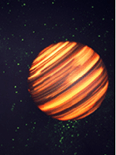
Annual Review of Astronomy and Astrophysics
Charting the latest discoveries in astronomy and astrophysics.Annual Review of Astronomy and Astrophysics is a premier academic journal published by Annual Reviews, dedicated to advancing knowledge in the fields of astronomy and astrophysics. With an impressive impact factor and recognition as a Q1 journal in both Astronomy and Astrophysics, as well as Space and Planetary Science, it stands amongst the top-ranked publications globally with Scopus Rankings placing it in the 99th percentile. The journal spans over three decades of scholarly contributions from 1990 to 2023, creating a rich repository of knowledge for researchers, professionals, and students alike. Although it does not offer Open Access, its rigorous peer-review process ensures the utmost quality and relevance of published articles, making it an essential resource for anyone seeking to stay at the forefront of developments in the cosmos. With its dedication to covering the forefront of research and essential reviews, the Annual Review of Astronomy and Astrophysics is vital for those engaged in exploring the universe and its phenomena.